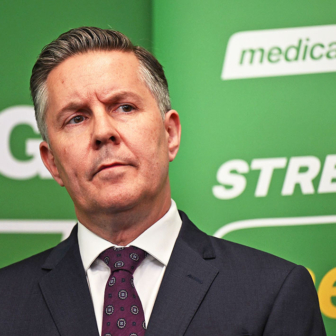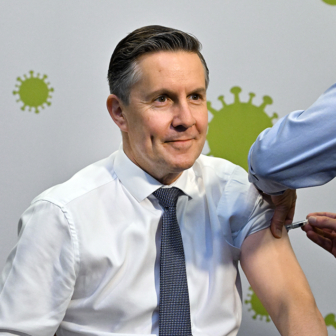ONE RECENT Sunday afternoon, after several weeks of feeling poorly, I made the uncomfortable transition from being an observer of the health system to a user of it. As I took off my clothes, put on the green gown provided by the hospital, and followed the instructions for having an X-ray, I felt terribly vulnerable. Was this going to be one of those moments in which everything changes?
Fortunately, my fears were groundless, and I was soon restored to my usual sense of self. But the unsettling experience was a timely reminder of why health policy – an area often obfuscated by impenetrable jargon and self-interested powerbrokers – matters so much.
Even if you find health policy debates mind-numbingly dull – as news editors have been complaining in the United States, where even the Obama factor is not enough to stop audiences switching off – there will come a time when they are suddenly, awfully relevant.
And so it is worth at least trying to have a conversation about healthcare policy that moves beyond the usual predictable claims and counter-claims, because it has become abundantly clear that things cannot continue as they are, at least not if we want affordable, accessible, quality care. Another reason for having this conversation, apart from matters of naked self-interest, is that what we want from our health system says much about what we value as a society. Do we really value a fair go for all?
For all its flaws, the final report of the National Health and Hospitals Reform Commission offers an opportunity for this conversation. And one of its most controversial suggestions, that we move to “a next generation of Medicare,” involving managed competition between health funds, merits careful examination.
It’s unfortunate that the commission suggested this new model be called “Medicare Select,” a name that reinforces fears that universal coverage will be eroded, when that is not what it is proposing. In one sense, though, these fears are something of a furphy anyway. Our current system provides “universal” cover in theory rather than practice, and does quite a good job of upholding the “inverse care law.” Coined by English GP Julian Tudor Hart in 1971, this law states that those with the greatest need for care are least likely to get it.
Think, for example, of how poorly the current system serves Indigenous Australians, people with mental illness or other complex needs, and people from the bush, the outer suburbs and other areas not favoured by health professionals. Think too of the lottery of hospital waiting lists, the GP practices that have closed their books, and the differences in the care afforded to some patients versus others with the same conditions, and it soon becomes apparent that our so-called “universal” system is forced to ration healthcare, albeit in ways that are often irrational.
Inequities like these have increased over the past decade thanks partly to federally funded incentives for private health insurance, which have tended to benefit the better-off and help skew the system in favour of procedural medicine (when we should be skewing it in favour of primary care if we want to improve equity, access and outcomes). Even the National Health and Hospitals Reform Commission’s report noted “increasing concerns that a two-tiered health system is evolving.”
Some observers were also quick to assume that the Medicare Select proposal signalled a shift towards a US-style privatisation, when in fact it was countries on the other side of the Atlantic, with a far greater sense of social solidarity, that provided the inspiration.
The proposal is similar to measures introduced in the Netherlands in 2006 – measures that have also been floated as a possible model for reform in the United States and elsewhere. Holland now requires all adults to buy health insurance, with children insured for free. Health funds are paid from both the public purse and private contributions, and are paid more by the government for taking on people likely to have poor health. Low-income families can apply for a subsidy, and more than 50 per cent of Dutch households received such assistance in 2008. All insurers must offer everyone a government-defined policy, which covers primary, inpatient and outpatient care and is updated annually. Only limited dental and allied healthcare is included in this, but people can pay extra for supplementary policies.
And the system does seem to be very concerned with ensuring fairness. According to a recent British Medical Journal article describing the reforms, “The Dutch live below sea level behind dykes, and history has taught them that solidarity pays off. This solidarity has built a healthcare system that treats all alike. There is little difference in the use of care between people with different educational levels or ethnic backgrounds after differences in need have been taken into account.”
But perhaps it’s not so surprising that the Medicare Select proposal met with suspicion, given the context within which the commission was established. Despite widespread concerns about the inequitable, inefficient private health insurance rebate, this issue was specifically excluded from the commission’s brief. Further, the government appointed Christine Bennett, a senior executive from Bupa Australia (whose health insurance brands include HBA, MBF and Mutual Community), to head the commission.
This has fuelled concerns that the interests of the big health funds are driving the proposal. Medibank Private’s enthusiasm for change has attracted particular scrutiny because the fund has been repositioning itself as a health insurer and service provider, which raises the prospect of the much-maligned concept of managed care – or “managed scare” as some wits prefer, referring to the Australian Medical Association’s effective campaigning whenever there’s a whiff of anything that remotely smells of the concept.
The confusion about Medicare Select also arose because the commission’s report sketched only a broad outline of how it might work – providing little more than a “thought bubble,” as one academic quipped – and suggested the Commonwealth fill in the gaps with a feasibility study. Perhaps this was because not all of the commission’s members were convinced of the proposal’s merits; or perhaps it was because, as the report acknowledged, “there are many technical and policy challenges” involved.
To help allay the confusion, the Parliamentary Library helpfully commissioned a paper by Anne-Marie Boxall, which concluded that Medicare Select “is not akin to privatising the system,” but would, like Medicare, be a universal, tax-funded health insurance scheme, financed through general revenue or a designated levy, as well as co-payments.
How it differs from what we have now is that the federal government would become the sole public funder of health services, distributing funds to intermediary bodies called “health and hospital plans,” which would pay for their members’ health services. All would be required to fund a core package of services, defined under a universal services obligation, and to take on all comers. Government funding for the plans would be skewed in line with the risk profile of their members. Plans with many elderly people suffering chronic illness, for example, would get more funding.
Boxall’s paper notes that many details remain to be thrashed out, including what would be covered by the universal services obligation, the role of state and territory governments in providing services, and how to deal with market failure, particularly in remote and rural areas where it is difficult to establish a competitive market.
CLEARLY, it’s a model that would require seismic change in both the public and private sectors, as well as a shift in Australians’ behaviour, given that more than half of us now haven’t had to bother about choosing an insurer. But if upheaval, with all its attendant risks, is the solution, then it’s worth asking what the problems are that Medicare Select would aim to fix.
Some supporters, like prominent psychiatrist Ian Hickie, view the proposal as a means for creating a system that is fairer and more responsive to the community’s needs. Hickie, executive director of the Brain and Mind Institute at the University of Sydney, also hopes it would provide the muscle to tackle the distortions in our current system that favour the powerful procedural specialists at the expense of community-based care.
He dismisses as “nonsense” the claim that only economic rationalists could approve of Medicare Select. “It’s a system we could all love if we were allowed to consider it,” he says. “It’s not about economics; it’s about better choice and services.”
Francesco Paolucci, an economist at the Australian National University who worked in the Netherlands for several years – and whose forthcoming book compares the health financing systems of several countries – also sees the Dutch model as fairer than the current Australian public–private mix. “In the Netherlands,” he says, “there is a mandate for everyone to purchase a standardised and comprehensive package of health care services from an insurance fund of his or her choice.”
“Affordability is explicitly dealt with by regulation and subsidies such as income-related contributions and income-allowances, and a risk-equalisation scheme to prevent cream-skimming from insurers,” says Paolucci. “It's not a two tier system, it offers one standard for all, there is no one jumping the queue and waiting times are virtually minimised. In Australia if you have private health insurance, you can jump the public queue by getting care in the private sector.”
Philip Davies, professor of health systems and policy at the University of Queensland and previously deputy secretary of the federal Department of Health and Ageing, believes Medicare Select is worth pursuing. “There’s been a lot of misinformed stuff saying, ‘this is America, this is privatisation’,” he says. “That’s not true. If it could be made to work in an appropriately regulated and constrained way, it has the potential to be a very powerful force for good.”
According to James Gillespie, deputy director of the Menzies Centre for Health Policy, the model has the potential, in theory, to improve coordination of services and force a greater focus on patients’ needs. “There’s a view that having a single payer would be a better system than the more fragmented system we have at present with a large private system,” he says. “Because the funds would be paid on a risk-adjusted basis, they’re encouraged to take on difficult patients and they then in theory do well if they can manage those patients better, keep them out of hospital.”
But the scheme would need sharp regulation and administration “to keep one step ahead of funds” seeking to cherry-pick the healthy and wealthy, Gillespie adds. Paolucci agrees, saying that one lesson from Holland is that constant scrutiny and readjustment is required.
Henry Ergas, a Canberra-based economist with longstanding experience in competition and regulatory policy, is another who believes Medicare Select might be fairer than our current system. “The reason it could deliver greater equity is because what it’s saying to people on lower incomes is that we will fund you to get the same type of cover that richer people get,” he says. “You won’t get the sort of situation now where most people with high income have private health insurance, but people with low income don’t.”
Bob Wells, co-director of the Menzies Centre for Health Policy and a former senior federal health bureaucrat, also sees potential for the model to be more “socially just” than what we now have. “It seems to be the only model that says, we’re responsible for your care, our business model is best if we can keep you out of hospital,” he says. “Therefore we’re more likely to give you preventive programs and put some burden back on you the patient to look after yourself a bit. “A system that gave the entitlement to the patient and the money to follow the patient would give incentives to the providers to relocate or rearrange their incentives,” he adds. “I’m increasingly coming to think that sort of model in the long term is possibly the best way to go.”
Don’t be misled, however, into thinking that such comments signal widespread support for Medicare Select among health policy buffs. There are plenty of trenchant critics – and more from them later. Indeed, Wells says he fell into that camp until about a year ago, believing that the managed competition concept was “a bit too purist economically and would never work.”
Someone who helped change his mind is Just Stoelwinder, whom Wells describes as “a very sensible bloke, he’s not a zealot and has some very persuasive evidence from the Netherlands that shows these arrangements can be made to work in countries that have many similarities to Australia.” Stoelwinder is chair of health services management at Monash University, a director of Medibank Private, and one of a small group acknowledged by the commission as influential in its development of Medicare Select. His breadth of experience in the public and private sectors – he trained as a physician, drove major reforms while at the helm of the Southern Health Care Network in Melbourne, and once sat on the board of the Private Health Insurance Administration Council – has made him acutely aware of the downside of fragmentation of funding and services.
Stoelwinder also warns that a universal health scheme may not be sustainable without reform, given the inexorable rise in health costs, with an average 3.8 percent increase above inflation in total per-capita spending on health over the past decade. He argues that the current system creates incentives for powerful stakeholders, like the medical profession and state governments, to whip up political storms to back their campaigns for more money, while taxpayers have little say over how much they want to spend on health in relation to other priorities.
Stoelwinder was born in Holland, and found his Dutch handy while on a five-month sabbatical there last year, reviewing the impact of recent health reforms. He recently went back for another look, taking a group from New Zealand and Australia (he won’t say who, but it’s a safe guess Medibank Private was well represented) to do their own research.
One advantage of the Dutch system, he argues, is that it makes the community more aware of the real costs of healthcare. Half of the income of health funds comes via payroll tax, whose rate varies according to healthcare costs. The average annual premium is equivalent to around $2000. “What this system does is say the cost of health care is visible to everybody, irrespective of whether you’re rich or poor,” he says. “It’s a way of forcing the community to engage in the hard choices.”
But Stoelwinder’s main argument in support of the Dutch system is that it will enable consumer choice to drive improvements in quality and efficiency – the theory being that the funds whose members receive the best and most cost-efficient care will win the most business.
THIS, I must admit, is where I start seeing red flags. It is also where I must confess to being something of a hypocrite. I spend much of my professional life encouraging people to be more informed about and engaged in their health decisions – to ask questions of their doctors and other health professionals – and have co-authored two books along these lines.
But I’m not so good at walking the walk; I can find it difficult, when in vulnerable patient mode, to ask the tough questions myself. The power and knowledge imbalance that even well-informed consumers face in negotiating the health system should never be underestimated. And in other areas of my life where Stoelwinder’s consumer choice argument might equally apply – choosing mobile phones or superannuation, for example – I am worse than pathetic. I am more likely to take a wild stab in the dark than to comb the fine print looking for the best buy.
Stoelwinder, however, thinks scepticism about the potential for consumers to drive system-wide improvement in healthcare is patronising, and notes that Dutch entrepreneurs have already seen an opportunity and started businesses to aid those consumer decisions.
Told of this argument, one senior health policy insider advised me to check out an Australian website, iselect.com.au, purporting to help people navigate the maze of health insurance. “In fact, it’s operated by just nine funds and only offers their products, and two of those funds are ‘restricted membership’ funds,” says my source. “It’s a good local example of how such ‘decision aids’ may not in fact be all they’re dressed up to be.”
On the other hand, a major Dutch consumers’ association, Consumentenbond, is reported to have supported the reforms because of the important role they give consumers in choosing their insurance plan and because they would force healthcare providers to coordinate their efforts and reduce waiting lists.
Australian consumers are more cautious, however. Carol Bennett, executive director of the Consumers Health Forum of Australia, says that while it would be terrific if a Medicare Select model could push health services to be more innovative and responsive to consumer needs, there are many potential barriers.
“The biggest concern,” she says, “is that people with low levels of health literacy and little internet access will be particularly disadvantaged. I think the devil is in the detail. You could look at our existing system and say it’s a perfect model. It could work very well, but it doesn’t and the reason it doesn’t is because of these vested powerful interests that don’t enable it to happen. So I don’t think that just imposing a new structure and a new model is necessarily going to change those things about the system.”
And do consumers really want choice in health insurance? Jim Butler, director of the Australian Centre for Economic Research on Health at the Australian National University, is not convinced. Even in the United States, the great majority of members did not opt out of the publicly funded Medicare when offered incentives to do so, he says. “The question people need to confront is, to what extent do people want greater choice of health insurer? My guess would be that somewhat less than 45 per cent would choose to do that.” Butler also cautions that managed competition has the potential to result in less consumer choice when it comes to access to services and providers, and this has also been raised in various journal articles critiquing the Dutch scheme.
“Some of the gains you may get from efficiency from competition between providers may come from restrictions of choice, for example, funds saying you must use one of these hospitals,” he says. “It’s a pretty tough trade off because my sense is that Australians really like their choice of provider.”
Ian McAuley, an economist who has been a vocal critic of current private health insurance incentives, is also sceptical about what is meant by “choice” in managed competition schemes. “The ‘choice’ it offers is flawed,” he says. “If it is to be so heavily regulated that all providers must offer the same type of services, then it is choice without variety. But if it allows variety, then it must surely start to look like managed care.”
McAuley argues that the notion of “choice” seems to have become an economic end in its own right, rather than a means to consumer welfare. “I enjoy exercising the choice of a meal, of a car, of a DVD, because I generally know what I want – or at least I think I do,” he says. “But my future health care needs? What lies waiting for me? I don’t know what sort of care I will want. I don’t want to commit to one ‘plan’ for an uncertain future.”
McAuley is also worried by the commission proposal that “people could purchase from private health insurers additional coverage not included under the universal service obligations.” This, he says, is “the wedge that will allow some government, either one feeling fiscal pressure or one with an ideological hatred of universal services, to scale back the ‘universal service obligations.’ It lays the foundation for a divided system – a parsimonious ‘charity’ system for the losers, and a comfortable private health insurance scheme for the majority, who will provide a political constituency to entrench private health insurance. It leads to the present ghastly political and economic situation in which the US finds itself.”
Unlike some of his colleagues at the Menzies Centre for Health Policy, Stephen Leeder, professor of public health at the University of Sydney, is not at all convinced that Medicare Select would drive improvements in the quality or coordination of care. He also questions the fascination for “bright shiny new models” rather than making the system we already have work better. “How do we know that these private entities are going to be better at pulling care together than the might of Medicare, amongst the power of interest groups?” he asks. “Anyone in the world with a policy brain will say to you that a single payer system has the most going for it.”
DESPITE THE INTEREST in “going Dutch” – the title of an enthusiastic article in the New England Journal of Medicine in 2007 – it is still too early to be sure what this really means. Even those involved in the reforms describe them as a “work in progress.”
Kieke Okma, a former senior advisor to the Dutch Health Ministry and now an academic at New York University, has been puzzled by the urgency of recommendations to export the Dutch experience and cautions against “foolishly claiming that the Netherlands offers a magical answer” for other countries. “We might be better off waiting to see in a few years how it works out and what adjustments will be needed,” she wrote in the Journal of Health Policy, Politics and Law last December.
Okma also warns other countries against relying on “hit and run” commentary about the Dutch experience, especially if it is based on a brief visit, a quick survey of the available literature, or brief contacts with government officials and Dutch experts. “In general, it is hard to obtain an accurate understanding of what happens in another country,” she says. “Health care is a complicated sector, with many competing claims by governments and other stakeholders over scarce resources. All those actors have a stake in selecting and presenting facts in support of their position.”
But Okma says a few things are clear about the Dutch experience. The reforms were extremely complex, demanding intense government engagement; the tax department, for example, had to hire more than 500 new staff just to administer the subsidy for low-income families. And the reforms have promoted market concentration in health insurance and healthcare service providers, with the “predictable consequence” of increasing costs, potentially leading to restrictions in access to services. “The market concentration has also led to centralised administration as part of larger, perhaps more efficient but certainly more impersonal and distant financial conglomerates that have replaced the notion of local or regional sick fund membership,” Okma says.
Another article in the same journal, by academics from the United States and the Netherlands, also concluded that the Dutch model “does not meet policy makers’ expectations for achieving cost containment while preserving or improving quality and access.” According to the article, the problems that might emerge in the future included an erosion of benefits in the basic package, mergers in health funds reducing consumer choice, and stakeholders lobbying for the removal of regulation designed to preserve solidarity.
Such concerns ring true for Denys Correll, an Australian living in the Netherlands, where he is executive director of the International Council on Social Welfare. He has been surprised by the strong advocacy for the Dutch system when there has been so little independent evaluation published. “When you have multiple purchasers, you’re not going to get much in the way of cost control,” he says. Correll is also sceptical of claims that the Dutch system is fair. “Every insurer has to accept anyone for basic level, but for all the higher levels of insurance they can reject people. So if you’ve got chronic conditions, you might get into areas that they won’t cover.”
A former head of the Australian Council on Ageing, Correll says that those wanting to overhaul Medicare should pause to remember what it used to be like before there was national health insurance. In those days, he was a social worker in hospitals in Melbourne and Adelaide. “I will always remember one man who came into Caulfield hospital, who had half his brain removed because of a tumour, and the hospital took all his assets to pay his hospital bill,” Correll says. “They literally garnished his final payment from his work. He could never work again and he was in his thirties. That was scandalous for me, that someone could be bankrupted because he wasn’t covered. When people slag off Medicare, I think – that’s what Medicare stopped.”
FOR ME – as someone who writes a great deal about rural health – one of the major unknowns about European models of social insurance is how they would translate to a country such as ours. I was much struck by the fact, mentioned in one journal article, that 95 per cent of the Dutch population lives within 3.5 kilometres of the nearest GP.
For the past five years, I’ve been a regular contributor to Australian Rural Doctor magazine, and it is one of my favourite gigs. While rural health tends to hit the mainstream media as a bad news story, one reason I like covering it is the wealth of stories about communities and services working together to develop innovative solutions to their local needs. This often occurs in the face of considerable adversity, including obstruction from larger state and federal bureaucracies.
I could give many such examples, but one that springs to mind is the Katherine West Health Board, which provides comprehensive primary healthcare to communities spread across vast distances to the west of Katherine. It is widely seen as a leading example of an Aboriginal community–controlled health service, and its approach is now underpinning the development of regional primary healthcare services across the Northern Territory. It is also something of a pin-up model for those who would like regional fundholding – whereby health funding from all layers of government is pooled and allocated to regions according to need – to drive health reform.
A prominent advocate of regional fundholding has been health policy adviser Fiona Armstrong, the immediate past chair of the Australian Health Care Reform Alliance. She is “deeply disappointed” that the National Health and Hospitals Reform Commission report didn’t support regional fundholding, which had been endorsed by the fifty-odd organisations involved in the alliance and suggested in a number of other submissions to the commission.
Armstrong has been a vocal public critic of Medicare Select, arguing that it would improve neither equity nor efficiency, and would not have scope for influencing the social and economic determinants of health and population health outcomes. She says regional fundholding would be fairer and keep services more responsive and accountable to local communities, helping to reduce the disparity between the “massive overservicing” that happens in metropolitan areas and the under-servicing of the bush.
Armstrong is co-authoring a paper on regional fundholding, to be published by the Centre for Policy Development, and has sent drafts to Kevin Rudd’s office. “It will take a huge effort to get regional organisations back on the table,” she says. “I remain optimistic that it’s not impossible because I do think it’s the best possible direction. We already have very good models of community controlled health care in Australia and, where they’re well resourced, they work very well.” As with any health policy, regional fundholding has its share of critics, and the recently released Report to Support Australia’s First National Primary Health Care Strategy describes both the potential benefits and downsides of such an approach.
Perhaps a one-size-fits-all brand of health reform is not a wise prescription for a country as diverse as ours. “It does seem that the regional fundholder model might make more sense for smaller centres and the social insurance model for the major metropolitan areas,” says Henry Ergas. Philip Davies also argues against seeing health reform as an “either/or” choice between competing options. “It’s feasible that Katherine West Health Board could itself evolve into a health and hospital plan,” he says. “Indeed, Medicare Select could be the very vehicle that allows regional fundholding to come into being.”
AT A DINNER PARTY some years ago, a colleague expressed surprise that I had stuck with reporting on health for so long. She had not particularly enjoyed her own time on the round, she said, because it was so difficult to work out who was telling the truth.
I can’t remember how I replied, but lately I’ve been thinking quite a bit about what I should have said. No one tells “the truth” in health because there rarely is such a thing; you are much more likely to find multiple and often competing versions, all which may hold some merit.
No doubt that’s true for any field but it seems particularly so in health, where there are endless complexities and uncertainties and different lenses for viewing the world, whether you’re talking policy, clinical practice or research. The one thing that can be said with some certainty about any health measure – whether a policy reform or a clinical intervention – is that it will carry more risks and uncertainties than its advocates acknowledge.
That’s why these in-depth conversations are worth having, even if they do take a deal of time and effort. And they need to be ongoing. In Holland, twenty years passed between the suggestion and implementation of the managed competition model. •
Melissa Sweet is a freelance health journalist. She has honorary appointments in the School of Public Health at the University of Sydney and the School of Medicine at Notre Dame University (Sydney campus).
• Melissa Sweet discusses this article with professors Stephen Leeder and Ian Hickie on Radio National’s Life Matters.




